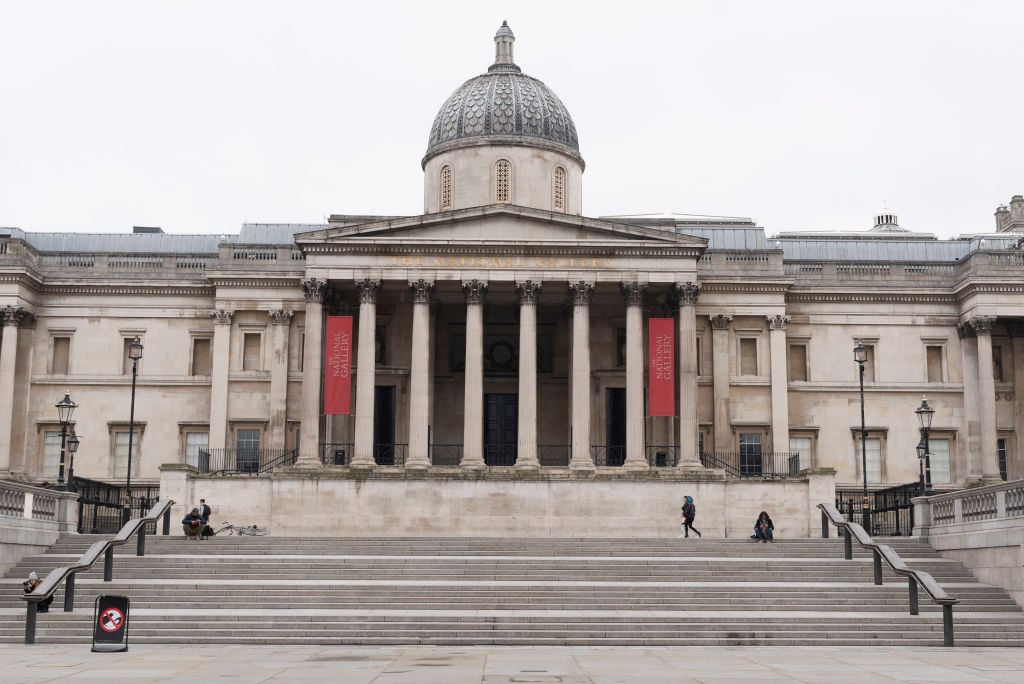
After trade associations successfully lobbied the UK government to include art galleries alongside other “non-essential retail” businesses in its plan to ease lockdown restrictions, a dozen central London galleries have announced that they will reopen on June 15.
Galleries in London’s West End have decided collectively that they will open by appointment only. Social distancing will be observed, and visitors are encouraged to bring their own masks, or will be given them on arrival.
“I know that our members are looking forward to opening their doors again after the long lockdown,” Christopher Battiscombe, the director general at Society of London Art Dealers, said in a statement. “Much as they have enjoyed doing business online, it will be great for them to be able to meet their customers face to face again and we are confident that this can be done safely while observing all the necessary precautions.”
Galleries reopening on June 15 include White Cube Mason’s Yard, Thomas Dane Gallery, Luxembourg & Dayan, Holtermann Fine Art, Stephen Friedman Gallery, Gagosian, Goodman Gallery, Hauser & Wirth, Annely Juda Fine Art, Pace Gallery, Simon Lee Gallery, Skarstedt, Sprüth Magers, Galerie Thaddaeus Ropac, and David Zwirner.
James Turrell, Sagittarius, Medium Elliptical Glass (2019). © James Turrell, courtesy of Pace Gallery and Kayne Griffin Corcoran. Installation view at Pace Gallery, London. Photo by Damian Griffiths.
“Opening by appointment only allows for high-security standards and greater social distancing control,” a spokesman for Pace Gallery tells Artnet News, adding that it will also make it easier to make adjustments to the protocol if they are needed by the end of June.
The gallery will be reopening its James Turrell exhibition (through August 14), and is also considering installing a new work by the artist that it hopes will offer visitors a moment of solace in the current atmosphere. The next step for Pace will be to gradually offer more availability for the public to book viewing slots on Eventbrite, which it used previously for its teamLab exhibition in 2017.
The gallery is meanwhile following government regulations on best practices in its other locations, open by appointment only in Geneva and with limited capacity in Hong Kong and Seoul. “An interesting point about London though, is the sense of unity amongst galleries,” the spokesman said. “Reopening is a concerted effort and we’ve had several conversations with neighboring galleries, colleagues and friends, to make the best decision, share good practice and coordinate this process.”
The gallery hopes to reopen its two locations in Manhattan by appointment later in the summer, ahead of a public reopening in the fall.
David Goldblatt, Playground, Chiawelo, Soweto. September 1972. Vintage silver gelatin print. Courtesy of Goodman Gallery.
Meanwhile, Goodman Gallery is planning a “soft opening” on June 15, offering appointments to view selected works while it deinstalls its Shirin Neshat exhibition. “We felt that it would be important to reopen with something new that would speak to this moment,” a gallery spokeswoman tells Artnet News, referring to the global Black Lives Matter demonstrations protesting the killing of a black man in the US, George Floyd.
In July, the gallery will open a major presentation of photographs by the South African artist David Goldblatt. The show will be Goldblatt’s first solo exhibition in London since 1986, when he showed work at The Photographers’ Gallery. It will be a presentation of the photographer’s documentation of the fight for racial equality and social justice grounded in the images he took in his hometown of Johannesburg. “We felt that this was an important moment to bring his work to the London audience,” the spokeswoman said.
The gallery will be taking visitor’s temperatures, a decision influenced by the similarly cautious approach the government has advised businesses to take in its home country of South Africa.
Yinka Shonibare CBE, Justice for All (2019). Copyright the artist, courtesy the artist and Stephen Friedman Gallery, London.
Stephen Friedman Gallery will reopen its Andreas Eriksson show, but will also be responding to the moment by showing a timely sculptural installation by Yinka Shonibare, titled Justice for All, in its main gallery window, looking onto Old Burlington Street. The sculpture is a postcolonial re-configuration of FW Pomeroy’s golden Lady Justice, which looms over London’s Central Criminal Court.
Installation view, “Isa Genzken. Window,” Hauser & Wirth, London. ©Isa Genzken / Licensed by Artists Rights Society (ARS), New York. Courtesy the artist, Hauser & Wirth and Galerie Buchholz Cologne / Berlin / New York. Photo by Alex Delfanne.